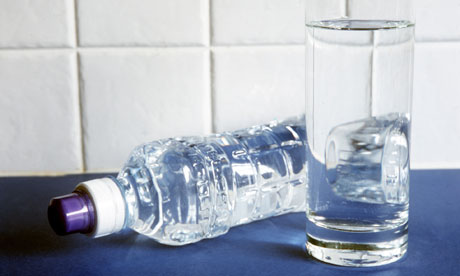
Colonic irrigation has been the subject of many newspaper articles in recent weeks. So one might think the debate about this subject has come and gone. But, as so often when it comes to alternative medicine, much of what was written did not make a lot of sense. Time, perhaps, to look at this treatment and any new evidence in some detail.
Colonic irrigation is, of course, a "detox" therapy. In medicine, the term detox is used in two different ways. In conventional medicine, it describes a programme of weaning drug-dependent patients off their addiction. In alternative medicine, the term is used for treatments allegedly ridding the body of toxins.
Alternative detox is all the rage and comes in many guises – anything from diet or supplements to steam-baths or ear-candles. The common denominator is that, allegedly, the body is stimulated to eliminate poisonous substances. The claim is that, if we are not treated in this way, such toxins would cause ill health in all of us. Yet, these assumptions are both wrong and dangerous.
Unless someone is very severely ill, the elimination of toxins is most efficiently being taken care of by various organs – for instance, the liver, kidneys, skin, lungs and the gut. In a healthy person, the function of these systems is already optimal. No improvements are needed or can be achieved by detox therapies.
Proponents of alternative detox have never been able to demonstrate that their treatments actually decrease the level of any specific toxin in the body. Yet such studies would be very simple to conduct: name the toxin, measure its level before and after the treatment and compare the readings. Why do such studies not exist? I suspect it is because the promoters of detox treatments know only too well that their results would not confirm their assumptions. And that would, of course, be bad for business.
The concepts of detox are not just wrong but also dangerous. They imply that a person can happily over-indulge, ie poison his/her "system" with toxins, and subsequently put everything right again by applying this or that detox method. This message might prompt people to live unhealthy lifestyles in the belief they are causing no harm to themselves. A recent study concluded that "dietary supplement use may create illusory invulnerability, reducing the self-regulation of smoking". In this trial, 74 smokers were randomised in two groups. One lot were given pills to take and told accurately that they were placebos. The other group were given the same pill but told it was a dietary supplement with positive health effects. Those volunteers thinking they were taking the supplement smoked more as a result. A further experiment then demonstrated that the effect was due to people feeling a higher degree of "invulnerability" when taking a "healthy" supplement.
One of the most popular detox treatments is colonic irrigation. Conventional healthcare describes the technique used for cleansing the colon, for instance, before surgery. In alternative medicine, colonic irrigation is promoted by celebrities, alternative practitioners and their organisations for a very wide range of indications: alcoholism, allergies, arthritis, asthma, backache, bad breath, bloating, coated tongue, colitis, constipation, damage caused by nicotine or other environmental factors, fatigue, headache, hypercholesterolemia, hypertension, indigestion, insomnia, joint problems, liver insufficiency, loss of concentration, mental disorders, parasites infestation, proneness to infections, rheumatoid arthritis, sinus congestion, skin problems, ulcerative colitis and many more. However, there is no good evidence from controlled clinical trials to suggest that colonic irrigation lowers toxin levels of the body or that it is an effective therapy for any condition at all. None of the numerous claims made by therapists and their professional organisations are therefore supported by good evidence.
But why not? If the person wants it, or feels better for it, or experiences weight loss after it, then he or she should have it. There are several reasons why this argument is problematic. The perceived benefit after the treatment is based on a wrong impression; even the weight lost is not real, it merely corresponds to the contents of the colon which fills up again in a matter of hours – true body weight loss does not occur. Moreover, there are risks associated with colonic irrigation. The side-effects include nausea, vomiting, diarrhoea, nervous disturbances, cramps and irritations as well as electrolyte depletion, water intoxication, bowel perforation and infection, kidney failure, pancreatitis or heart failure. One also wonders what colonic irrigation does to the bacteria on our gut. Severe side-effects might be rare but, considering the lack of true benefit from colonic irrigation, they still mean that the risks of this treatment do not outweigh its benefits.
This brings us back to the recent media attention on colonic irrigation. It was triggered by a paper entitled "The dangers of colon cleansing". It did not refer to "new studies" as Susanne Moore put it but merely reported the cases of two patients for whom this treatment had brought life-threatening side-effects. The authors also confirmed that "no scientifically robust studies in support of this practice" exist.
Writing in the Guardian, Susanne Moore argued that "all the fine doctors and sceptics who rail against such nuttiness never take into account the psychological reasons that people seek out these forms of help". I think she is wrong. Good doctors do just that. Many promoters of "integrated medicine" seem to think that clinicians are either caring or scientific. The undeniable fact, however, is that good doctors are both: they care for their patients (this involves taking into account "psychological reasons" for their actions) and they realise how important science is for optimal healthcare. The notion of "either/or" is nonsense which only serves those who want to smuggle unproven or disproven treatments into the NHS by calling it "integrated medicine".
Edzard Ernst is professor of complementary medicine at Peninsula Medical School, Exeter

